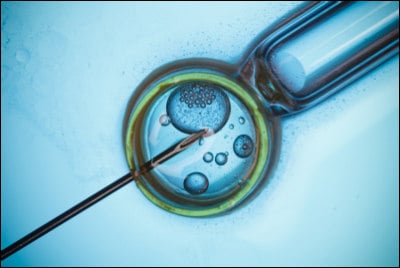 Advancements in technology have allowed couples to have a child even if they are not able to conceive on their own. One such technology is in vitro fertilization (“IVF”). IVF is the process of extracting eggs from a woman’s body, combining them with sperm in a laboratory and then implanting them in the woman’s uterus. The excess embryos can be frozen and stored for later use. When the couple is ready to have a child, a frozen embryo can then be thawed and implanted in the uterus. This process is known as cryopreservation.
Advancements in technology have allowed couples to have a child even if they are not able to conceive on their own. One such technology is in vitro fertilization (“IVF”). IVF is the process of extracting eggs from a woman’s body, combining them with sperm in a laboratory and then implanting them in the woman’s uterus. The excess embryos can be frozen and stored for later use. When the couple is ready to have a child, a frozen embryo can then be thawed and implanted in the uterus. This process is known as cryopreservation.
Couples who are undergoing a divorce may find themselves in a contentious legal battle over the disposition of their frozen embryos. For example, if one of the parties fears not being able to have a biological child due to age or other physiological reasons, then that party may want to retain the frozen embryos for later use. However, the other party may want to destroy the frozen embryos or donate them for research because they do not want to be responsible for paying child support after the child is born.
Virginia law is not yet settled on how to resolve these disagreements over the disposition of frozen embryos in divorce.
Some courts in other states have ruled in favor of the party seeking to avoid parenthood. In Davis v. Davis (1992), the Supreme Court of Tennessee decided a dispute over frozen embryos in favor of Junior Lewis Davis, who sought to have the frozen embryos destroyed over the objections of his former wife, Mary Sue Davis. The decision in this case, although not binding in other states, suggested a framework for resolving similar disputes in Virginia and other states. The court held that in the event of a dispute, courts should enforce any prior agreement between the parties and in the absence of such an agreement, the court should weigh the interests of the parties, ordinarily ruling in favor of the party who wishes to avoid parenthood.
Other courts have held in favor of the party wanting to retain the embryos if that party, without the embryos, will likely never have biological children. In Reber v. Reiss (2012), in upholding a trial court’s ruling in favor of a woman seeking to retain frozen embryos, the Pennsylvania Superior Court held that:
because Husband and Wife never made an agreement prior to undergoing [in vitro fertilization], and these pre-embryos are likely Wife’s only opportunity to achieve biological parenthood and her best chance to achieve parenthood at all, we agree with the trial court that the balancing of the interests tips in Wife’s favor.
Other lines of cases have looked for a consent agreement between the couple and the fertility clinic concerning the use of the embryos, and for the most part, courts have chosen to follow the terms of the agreement (New York, Oregon, Texas, and Washington State).
In the absence of settled law or clear legislation, the couple going through the fertility clinic should make sure to cover in a written agreement what happens to the embryos in the event of a divorce.
If you are going through IVF, or if you undergoing a divorce and already have frozen embryos, be sure to consult an experienced family law attorney.
Livesay & Myers, P.C. has a team of experienced family law attorneys across offices in Fairfax, Ashburn, Manassas and Fredericksburg, representing clients across Northern Virginia. Contact us to schedule a consultation today.
